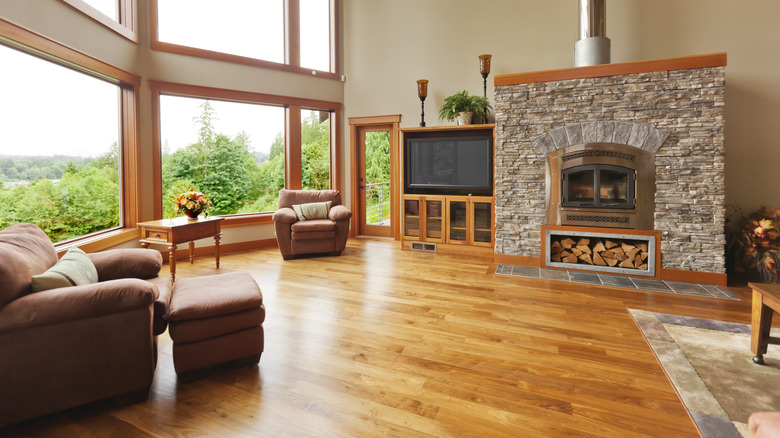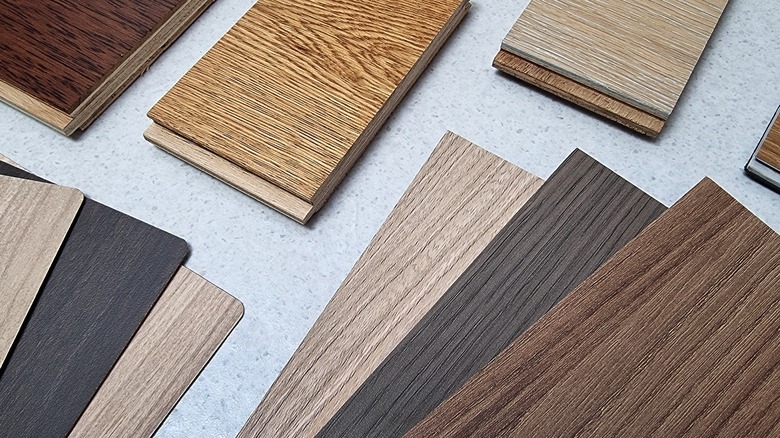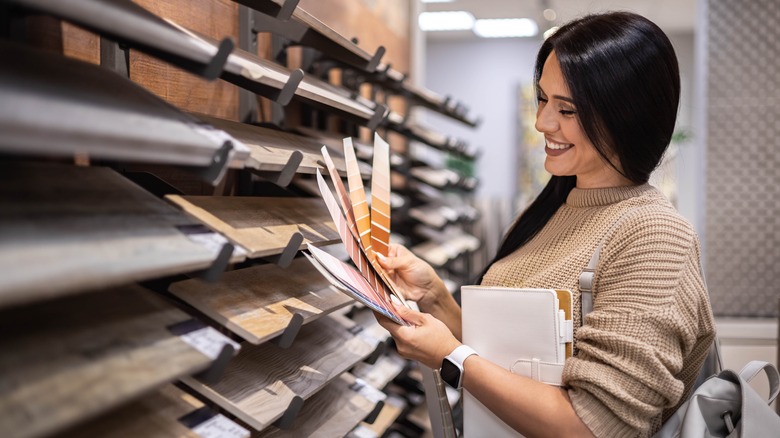The Most Durable Kind Of Engineered Hardwood Flooring You Can Find
When it comes to flooring options, engineered hardwood is a popular choice among homeowners seeking the perfect blend of aesthetics and durability. Unlike traditional hardwood, engineered hardwood is constructed by layering real wood veneers over a sturdy plywood base, offering a stable and versatile flooring solution. Homeowners are drawn to its natural beauty, ease of installation, and cost-effectiveness. However, not all engineered hardwood is created equal, and knowing the most durable and practical options — that is, maple and hickory — is crucial.
But what about Brazilian walnut (aka lapacho or ipe) or Brazilian cherry (jatoba), you might ask. If you find yourself protesting our choice to focus on maple and hickory, it's totally understandable. After all, according to Ambience Hardwood Flooring, the Janka ratings of ipe and jatoba are 16.4 and 10.5 respectively, while maple's is 6.4 and hickory's is 8.1. The Janka hardness scale is a measurement of the hardness of a wood species, indicating its resistance to wear, denting, and impact. The scale is named after Gabriel Janka, an Austrian wood researcher who developed it. Essentially, the Janka rating of wood helps us understand how well it can withstand wear and tear. A higher rating means the wood is harder and, in general, more resistant to dents and scratches.
Now, back to the question: Why maple and hickory? The reason is simple: Both types of engineered wood are widely accessible in terms of availability and price. Let's delve deeper into the benefits of each type of engineered wood.
Hickory and maple -- the better hardwood flooring options
When pitted against the most technically durable hardwood flooring options — ipe and jatoba — hickory and maple still emerge as winners. Why?
Hickory is renowned for its strength and durability, and for being low maintenance and water resistant. With a distinctive grain pattern and a range of natural hues, it adds character to any space and stands up well to heavy foot traffic. Moreover, hickory responds well to staining and finishing, should you prefer a specific look for your flooring. It's also more affordable than exotic hardwoods and is considered to be one of the cheapest premium hardwoods available.
Maple is valued for its fine grain and warm, light color that works to open up a space. These qualities make it an excellent choice for those who want a clean, modern look — although maple has remained a popular flooring option for decades. Its high resistance to impact and wear makes engineered maple flooring ideal for busy households, as well as gyms and bowling alleys. And since maple is widely available in North America, it's considered an eco-friendlier option compared to other hardwoods.
Why not ipe and jatoba?
Considered to be exotic flooring options, both ipe and jatoba are known for their exceptional hardness and durability, consistently topping Janka hardness tests.
However, ipe is known to be pricey due to its limited availability. Moreover, those who prefer to use ipe as a flooring or construction material also need to ascertain that it is sourced sustainably. According to MacDonald Hardwoods, the difficulty of procuring it once led to the illegal practice of clearing substantial tracts of rainforest land for relatively small harvests. Also, being a darker-hued flooring material, ipe may not be suitable for small spaces or can make a room feel smaller. Brazilian cherry or jatoba, on the other hand, though prized for its extreme hardiness, is also generally more expensive than other engineered flooring options. Similar to ipe, its rich dark color tends to make a space seem smaller rather than expansive.
Your choice of engineered hardwood flooring can vary based on factors, such as brand, finish, and thickness. But when it comes to durability combined with accessibility, versatility, and affordability, hickory and maple are the clear winners, especially since exotic hardwoods like ipe and jatoba tend to be more expensive. Ultimately, though, the choice between these hardwoods depends on your personal preferences, budget constraints, and desired aesthetic for your space.


